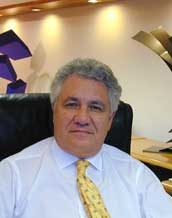|
| Biography |
| |
 Rafael Rangel-Aldao received his M.D. from University Central of Venezuela, and a Ph.D. from Albert Einstein College of Medicine, New York. For over twenty-five years as a professor of biotechnology at Simón Bolívar University, and as former Director of Research and Innovation of Empresas Polar (1987-2005), the largest food and beverage conglomerate of Venezuela and the third of Latin America, he has published extensively with scientific and technological contributions in a wide range of fields encompassing from biochemistry, molecular biology, chemistry, plant physiology, and medicine, to food product development, industrial processes, and agricultural research in marker-assisted plant breeding. Rangel-Aldao is author of several triadic patents in biotechnology applied to both the food and biomedical industries. Born in Caracas, Rangel-Aldao has received numerous awards and prizes, a member of several scientific societies, and visiting scientist at universities such as Yale, Lovain, Sao Paulo, and Catholic of Chile. He is or has been a member of the editorial board of Biological Research, Electronic Journal of Biotechnology, and Revista Colombiana de Biotecnología, as well as a writer of scientific journalism, activity that has rewarded him with several prizes. He is a frequent speaker at universities and companies of USA, E.U., and Latin America, as well as consultant of biotechnology issues for several Governments of Latin America and UN agencies.
Rafael Rangel-Aldao received his M.D. from University Central of Venezuela, and a Ph.D. from Albert Einstein College of Medicine, New York. For over twenty-five years as a professor of biotechnology at Simón Bolívar University, and as former Director of Research and Innovation of Empresas Polar (1987-2005), the largest food and beverage conglomerate of Venezuela and the third of Latin America, he has published extensively with scientific and technological contributions in a wide range of fields encompassing from biochemistry, molecular biology, chemistry, plant physiology, and medicine, to food product development, industrial processes, and agricultural research in marker-assisted plant breeding. Rangel-Aldao is author of several triadic patents in biotechnology applied to both the food and biomedical industries. Born in Caracas, Rangel-Aldao has received numerous awards and prizes, a member of several scientific societies, and visiting scientist at universities such as Yale, Lovain, Sao Paulo, and Catholic of Chile. He is or has been a member of the editorial board of Biological Research, Electronic Journal of Biotechnology, and Revista Colombiana de Biotecnología, as well as a writer of scientific journalism, activity that has rewarded him with several prizes. He is a frequent speaker at universities and companies of USA, E.U., and Latin America, as well as consultant of biotechnology issues for several Governments of Latin America and UN agencies.
|
| |
|
|
| |
| Abstract |
| |
|
North-South Collaboration: Digital Molecular Medicine |
|
|
|
Most developing countries have yet to assimilate major technological advances such as biotechnology and molecular medicine. There are exceptions, of course, but these are mostly due to lax intellectual property laws, low-cost generics, and vaccines that hardly reach the private sector to capture wealth and employment. Besides all obvious obstacles to technology transfer, two are noteworthy here, one is the accelerating rate of technology change; second, is the lack of integration at all levels of local innovation systems. Thus, scientific prowess and industrial infrastructure in no way assure a capability of novel science applications for developing countries. It would become necessary to connect skilled people with the hubs of networks where technology is effectively integrated into global innovation systems. This great challenge is also an opportunity for developing countries to catch up with an evolving new medicine of considerable importance to health systems world wide.
Three hypotheses are put forward as a framework to integrate scientists and physicians at the national level with their peers of global networks. The first, considers disease as preceded by the malfunction of biological informational networks that can be cartographed into digital maps to predict risk. Digital molecular medicine, as we called it, would emerge from cutting edge knowledge including systems biology, biotechnology, and nanotechnology, being translated into clinical medicine. The second, set ups collaboration as the linkage to global hubs of biomedical research, of three networks at the national level made of, (a), physicians; (b), molecular biologists; (c) computer scientists, physicists, and mathematicians to jointly build the digital maps. The third, formulates how developing countries could reap substantial benefits of social and economic importance by taking advantage of North-South collaboration. |
|
| |
|